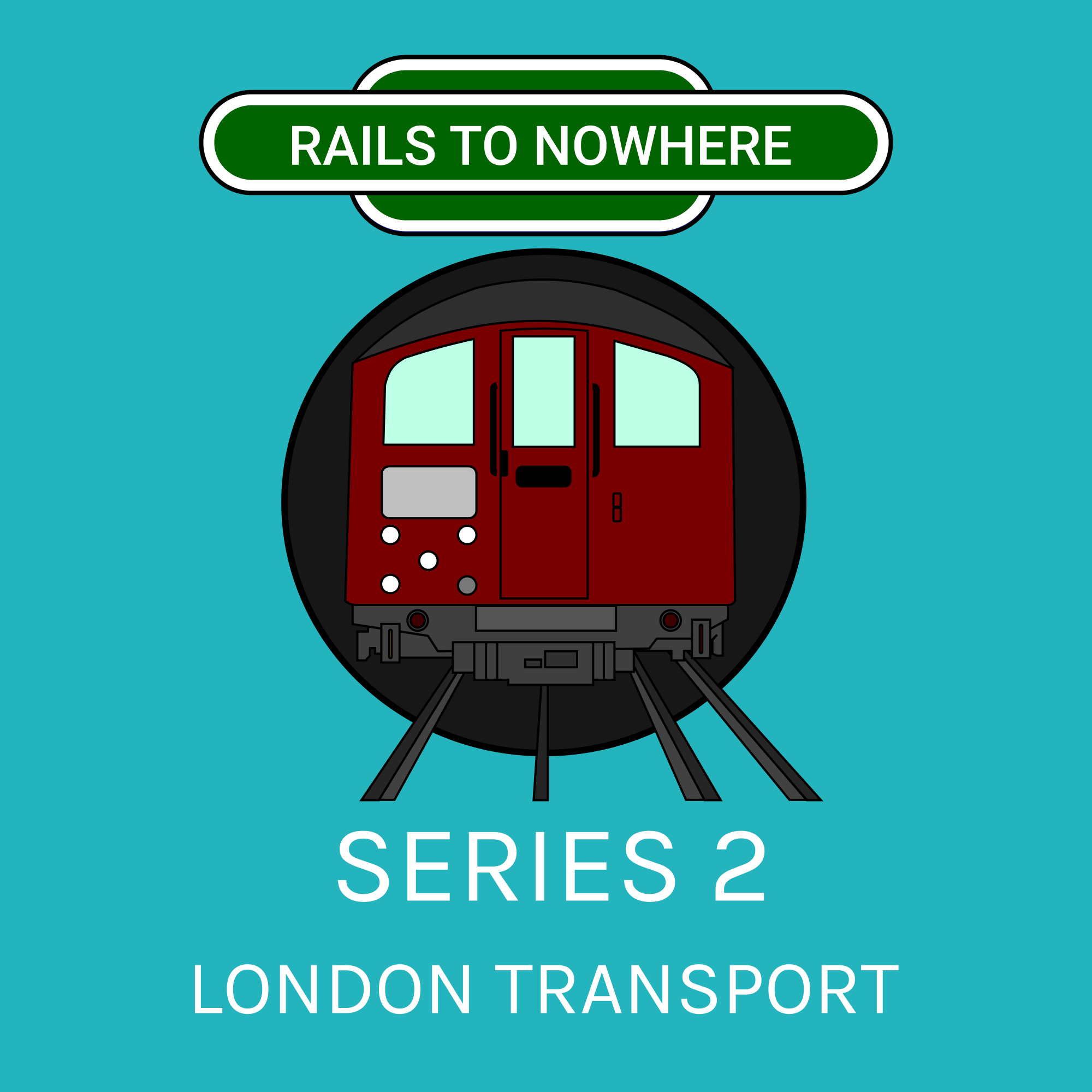Episodes
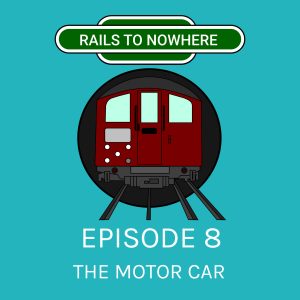
Monday Aug 14, 2023
E8 - The Motorcar
Monday Aug 14, 2023
Monday Aug 14, 2023
Show Notes
Simon is joined once again by guest Aaron to discuss the emergence of the Internal Combustion engine as a means of powering road vehicles. This small invention would herald in the era of the motor car and while we often thing of that being a post WWII phenomenon in this episode Simon explains how the origins of car mania are traced back to the 1800s.
Part of the research for this episode stems from Simon dissertation, submitted in pursuit of his MA in Railway Studies from the University of York, so an acknowledgement of the support from Dr David Turner and Dr Kevin Tenant in writing that dissertation is due.
Support the Podcast through our Patreon and get bonus episodes, behind the scenes content and more: www.patreon.com/railstonowhere
Thanks to our wonderful Patreons who help make Rails to Nowhere happen and especial thanks to our £10 patreon ValkyrieLeamons.
Follow Simon at: www.twitter.com/reddragontweets
Bibliography
‘A Brief History of the Internal Combustion Engine’, 2019. https://www.tuev-nord.de/explore/en/remembers/a-brief-history-of-the-internal-combustion-engine/.
Bagwell, Philip. The Transport Revolution. London: Routledge, 1988.
Bagwell, Philip, and Peter Lyth. Transport in Britain 1750 - 2000: From Canal Lock to Gridlock. London: Hambledon & London, 2002.
British Pathe. ‘London Traffic Scenes (1930)’. British Pathe YouTube Channel, 2014. https://www.youtube.com/watch?v=mAGBfm9uBso.
———. ‘Traffic Scenes in London (1930-1939)’. British Pathe YouTube Channel, 2014. https://www.youtube.com/watch?v=fbaElyhAF00.
His Majesty’s Government. ‘History of Road Safety, The Highway Code and the Driving Test’. www.gov.uk, 2019. https://www.gov.uk/government/publications/history-of-road-safety-and-the-driving-test/history-of-road-safety-the-highway-code-and-the-driving-test.
Law, Michael John. ‘“The Car Indispensable”: The Hidden Influence of the Car in Inter-War Suburban London’. Journal of Historical Geography 38 (2012): 424–33.
———. The Experience of Suburban Modernity: How Private Transport Changed Interwar London. Manchester: Manchester University Press, 2014.
Priolead, John. ‘The Chronicle of the Car: Poor Men’s Cars’. Illustrated London News. July 1929.
‘The First British Petrol Motor Car’. Accessed 4 February 2023. http://www.knowledgeoflondon.com/fredbremermotorcar.html.
The Marquis De Chasseloup-Laubat. ‘A Short History of the Motor Car’, 1902. https://sites.google.com/site/motormiscellany/cars-other-vehicles/a-short-history-of-the-motor-car.
London Transport Museum. ‘The Motor Bus Revolution’, 6 February 2023. https://www.ltmuseum.co.uk/collections/stories/transport/motor-bus-revolution-1900-1914.
Unknown. ‘Biggest Jam Ever: Traffic Blocks at Uxbridge’. Uxbridge & West Drayton Gazette. May 1937.
Webb, Simon. Commuters: The History of a British Way of Life. Barnsley: Pen & Sword History, 2016.

Monday Jul 31, 2023
E7 - The London Passenger Transport Act 1933
Monday Jul 31, 2023
Monday Jul 31, 2023
Show Notes
Join Simon and guest Aaron as they continue Rails to Nowhere's look at Simon’s dissertation research as we discuss the passage of the London Passenger Transport Act. Following on from the passage of the Railway Act 1921 the London Passenger Transport Act 1933 would be the next major step on the road to full nationalisation of the railways in 1948.
Part of the research for this episode stems from an essay written by Simon in pursuit of his MA in Railway Studies from the University of York, so an acknowledgement of the support from Dr David Turner in writing that essay is also due.
Support the Podcast through our Patreon and get bonus episodes, behind the scenes content and more: www.patreon.com/railstonowhere
Thanks to our wonderful Patreons who help make Rails to Nowhere happen and especial thanks to our £10 patreon ValkyrieLeamons.
Follow Simon at: www.twitter.com/reddragontweets
Bibliography
Bagwell, Philip, and Peter Lyth. Transport in Britain 1750 - 2000: From Canal Lock to Gridlock. London: Hambledon & London, 2002.
Barker, Theo. A History of London Transport: Passenger Travel and the Development of the Metropolis, Vol. 2, the Twentieth Century to 1970. 2 vols. Allen & Unwin, 1974.
———. ‘“Unification by Statute” and “The London Passenger Transport Board”’. In A History of London Transport: Passenger Travel and the Development of the Metropolis, Vol. 2, the Twentieth Century to 1970, 270–311 & 407–9. London: Allen & Unwin, 1974.
Barman, Christian. The Man Who Built London Transport: A Biography of Frank Pick by Christian Barman. Newton Abbot: David and Charles, 1979.
Croome, Desmond, and Alan Jackson. Rails Through the Clay: A History of London’s Tube Railways. 2nd Edition. Harrow Weald: Capital Transport, 1993.
Fowler, James. London Transport: A Hybrid in History 1905-1948. Bingley: Emerald Publishing Limited, 2019.
Franch, John. Robber Baron: The Life of Charles Tyson Yerkes. Urbana & Chicago: University of Illinois Press, 2008.
Glazier, Ken. London Buses Before the War. Harrow Weald: Capital Transport, 1995.
Grieves, Keith. ‘Sir Eric Geddes, Llyod George and the Transport Problem, 1918-1921’. Journal of Transport History 13, no. 1 (1992): 23–42.
Hawkes, Irene. A History of the Metropolitan Railway & Metro-Land. Manchester: Oxford Publishing Co, 2018.
Hey, Kevin. ‘Regulating London’s Bus Services 1919-1924: A Reappraisal’. The London Journal 34, no. 1 (2009): 17–32.
Horne, Mike. London’s District Railway A History of the Metropolitan District Railway: Volume I: Nineteenth Century. Crowthorne: Capital Transport Publishing Ltd., 2018.
———. London’s District Railway A History of the Metropolitan District Railway: Volume II: Twentieth Century. Crowthorne: Capital Transport, 2019.
Jackson, Alan. London’s Metropolitan Railway. London: David and Charles, 1986.
Maggs, Colin G. Great Britain’s Railways: A New History. Stroud: Amberley, 2018.
Martin, Andrew. Underground, Overground: A Passenger’s History of the Tube. London: Profile Books, 2013.
Murphy, Simon. ‘The American Father of the London Underground – Charles Tyson Yerkes’. The American Magazine, 2019. https://www.theamerican.co.uk/pr/ft-Charles-Tyson-Yerkes-London-Underground.
Peter, Cline. ‘Eric Geddes and the “Experiment” with Business in Government’. In Essays in Anti-Labour History: Response to the Rise of Labour in Britain, edited by Kenneth Brown, 74–104. Palgrave MacMillan, 1974.
Sherwood, Tim. Charles Tyson Yerkes: The Traction King of London. Stroud: The History Press, 2008.
Wolmar, Christian. The Subterranean Railway: How the London Underground Was Built and How It Changed the City Forever. London: Atlantic Books, 2005.
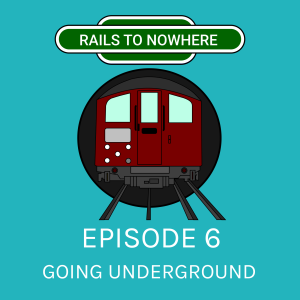
Monday Jul 17, 2023
E6 - Going Underground
Monday Jul 17, 2023
Monday Jul 17, 2023
Show Notes
In this episode we start our look at Simon's disseration work on London Transport policy in the 1930s. We start of with a look back at the context behind our later discussions as we talk about the early London Underground and the decisions which laid the fondations for the system.
Part of the research for this episode stems from an essay written by Simon in pursuit of his MA in Railway Studies from the University of York, so an acknowledgement of the support from Dr David Turner in writing that essay is also due.
Support the Podcast through our Patreon and get bonus episodes, behind the scenes content and more: www.patreon.com/railstonowhere
Thanks to our wonderful Patreons who help make Rails to Nowhere happen and especial thanks to our £10 patreon ValkyrieLeamons.
Follow Simon at: www.twitter.com/reddragontweets
Bibliography
Abercrombie, Patrick. Greater London Plan. London: His Majesty’s Stationery Office, 1945.
Badsey-Ellis, Antony. London’s Lost Tube Schemes. Harrow: Capital Transport, 2005.
Badsey-Ellis, Antony. The Hampstead Tube: A History of the First 100 Years. Harrow: Capital Transport, 2007.
Bagwell, Philip, and Peter Lyth. Transport in Britain 1750 - 2000: From Canal Lock to Gridlock. London: Hambledon & London, 2002.
Barker, Theo. ‘“Unification by Statute” and “The London Passenger Transport Board”’. In A History of London Transport: Passenger Travel and the Development of the Metropolis, Vol. 2, the Twentieth Century to 1970, 270–311 & 407–9. London: Allen & Unwin, 1974.
Board Of Trade. ‘Light Railways Act: Walthamstow & District Light Railway Order 1903’, 1903. MT 58/181. National Archive.
Casson, Mark. ‘The Determinants of Local Population Growth: A Study of Oxfordshire in the Nineteenth Century’. Explorations in Economic History 50, no. 1 (2013): 28–45.
Catford, Nick. ‘Lea Bridge’. Disused Stations, 2017. http://www.disused-stations.org.uk/l/lea_bridge/index.shtml.
Connor, Piers. ‘The American Influence’. In 150 Years of the District, 22–29. Crowthorne: Capital Transport Publishing Ltd., 2018.
Croome, Desmond, and Alan Jackson. Rails Through the Clay: A History of London’s Tube Railways. 2nd Edition. Harrow Weald: Capital Transport, 1993.
Franch, John. Robber Baron: The Life of Charles Tyson Yerkes. Urbana & Chicago: University of Illinois Press, 2008.
Halliday, Stephen. Underground to Everywhere: London’s Underground in the Life of the Capital. Stroud: The History Press, 1996.
Hawkes, Irene. A History of the Metropolitan Railway & Metro-Land. Manchester: Oxford Publishing Co, 2018.
Horne, Mike. London’s District Railway A History of the Metropolitan District Railway: Volume I: Nineteenth Century. Crowthorne: Capital Transport Publishing Ltd., 2018.
Horne, Mike. London’s District Railway A History of the Metropolitan District Railway: Volume II: Twentieth Century. Crowthorne: Capital Transport, 2019.
Horne, Mike. The Piccadilly Tube: A History of the First 100 Year. Harrow: Capital Transport Publishing Ltd., 2007.
Hylton, Stuart. What The Railways Did For Us: The Making of Modern Britain. 2nd ed. Stroud: Amberley, 2016.
Jackson, Alan. London’s Local Railways. 2nd ed. Harrow Weald: Capital Transport, 1999.
Jackson, Alan. London’s Metropolitan Railway. London: David and Charles, 1986.
Kellett, John R. The Impact of Railways on Victorian Cities. London: Routledge, 1969.
Levinson, David. ‘The Orderliness Hypothesis’. The Journal of Transport History 29, no. 1 (2008): 98–114.
London Passenger Transport Board. ‘Third Annual Report and Statement of Accounts and Statistics for the Year Ended 30 June 1936’. London Passenger Transport Board, 1936. LT000237/024. TfL Corporate Archive.
Long, David. London’s Underground: Architecture, Design and History. Stroud: The History Press, 2011.
Martin, Andrew. Underground, Overground: A Passenger’s History of the Tube. London: Profile Books, 2013.
Murphy, Simon. ‘The American Father of the London Underground – Charles Tyson Yerkes’. The American Magazine, 2019. https://www.theamerican.co.uk/pr/ft-Charles-Tyson-Yerkes-London-Underground.
Scott, Peter. The Making of the Modern British Home: The Suburban Semi and Family Life between the Wars. Oxford: Oxford University Press, 2013.
Shaw-Taylor, Leigh, and Xuesheng You. ‘The Development of the Railway Network in Britain 1825-19111’. Accessed 2 February 2023. https://www.campop.geog.cam.ac.uk/research/projects/transport/onlineatlas/railways.pdf.
Sherwood, Tim. Charles Tyson Yerkes: The Traction King of London. Stroud: The History Press, 2008.
Simmons, Jack. The Railway in Town and Country. 1830 - 1914. London: Faber & Faber, 2008.
Simmons, Jack, and Gordon Biddle, eds. The Oxford Companion to British Railway History: From 1603 to The 1990s. Oxford: Oxford University Press, 1997.
Webb, Simon. Commuters: The History of a British Way of Life. Barnsley: Pen & Sword History, 2016.
Wolmar, Christian. The Subterranean Railway: How the London Underground Was Built and How It Changed the City Forever. London: Atlantic Books, 2005.
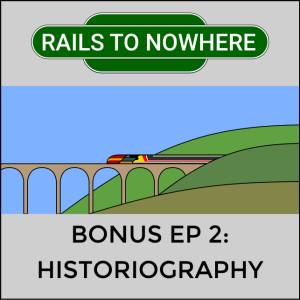
Monday Jul 10, 2023
B2 - Historiography Bonus (UNLOCKED)
Monday Jul 10, 2023
Monday Jul 10, 2023
In this unlocked patreon Bonus episode Simon and Ela discus Historiography and its importance to Historical study, and get distracted from discusing the Historiography of BR.
Support our Patreon for bonus episodes, behind the scenes content and more: www.patreon.com/railstonowhere
Thanks to our wonderful Patreons who help make Rails to Nowhere happen and especial thanks to our £10 patreon ValkyrieLeamons.
Follow Simon at: www.twitter.com/reddragontweets
For those who prefere youtube the video can be found here: https://youtu.be/iHKHa8yfB-U
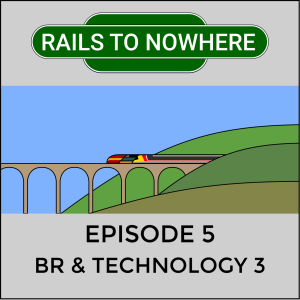
Friday Mar 31, 2023
E5 - British Rail and Technology Part 3 - The 1980s & 90s
Friday Mar 31, 2023
Friday Mar 31, 2023
In this episode Simon and Ela take their last look at the History of British Rail and innovation. Looking at the Thatcher and Major years todays conversation covers Pacers, Sprinters, and yet more signalling. Yet again we find that BR was a hive of technology and innovation stymie by the policies thrust upon it by the UK government.
Part of the research for this episode stems from an essay written by Simon in pursuit of his MA in Railway Studies from the University of York, so an acknowledgement of the support from Dr David Turner in Simon’s work for that course.
Follow Simon at: www.twitter.com/reddragontweets
Support the Podcast through our Patreon and get bonus episodes, behind the scenes content and more: www.patreon.com/railstonowhere
Thanks to our wonderful Patreons who help make Rails to Nowhere happen and especial thanks to our £10 patreon ValkyrieLeamons.
Gareth Dennis Talks Alternative APT History https://www.youtube.com/watch?v=FJJEeolcZaA
Bibliography
Bagwell, Philip, and Peter Lyth. Transport in Britain 1750 - 2000: From Canal Lock to Gridlock. London: Hambledon & London, 2002.
Barnett, Roger. ‘British Rail’s InterCity 125 and 225’. Built Environment 19 (1993): 163–83.
Charmley, John. The History of Conservative Politics Since 1830. Edited by Jeremy Black. 2nd ed. Basingstoke: Palgrave MacMillan, 2008.
Cowley, Philip, and John Garry. ‘The British Conservatives and Europe: The Choosing of John Major’. British Journal of Political Sciences 28, no. 3 (1998): 473–99.
Damazer, Mark. The Major Years. BBC 1, 1999.
Davies, Sir David. ‘Automatic Train Protection for the Railway Network in Britain - A Study’. The Royal Academy of Engineering, 2000.
Gareth Dennis and Kevin Tennent. ‘RailNatter | Episode 62: Pacers Were Bad and Saved Nothing (with Dr Kevin Tennent)’. Gareth Dennis You Tube, 19 May 2021. https://www.youtube.com/watch?v=OmQKtc5bnHg.
Gourvish, Terence. British Rail, 1974-97: From Integration to Privatisation. Oxford: Oxford University Press, 2002.
Green, Chris, and Mike Vincent. The Network South East Story. Hersham: Oxford Publishing Co, 2014.
Green, Miranda. ‘Why Did We Sell off the Railways? | FT Feature’. Financial Times Youtube Channel, 2018. https://www.youtube.com/watch?v=U6V-HDbX9A8.
Harris, Robin. The Conservatives: A History. Kindle. London: Bantam Press, 2011.
Jackson, Tanya. British Rail: The Nations Railway. Stroud: The History Press, 2014.
Kevin Tennent and David Turner. ‘The Transport Tavern: Trams & Pacers, with Kevin Tennent’. Dr David Turner You Tube Channel, 18 May 2020. https://www.youtube.com/watch?v=MvAe62mdpPE&list=PLeKnFHihTV5rj6FLgNoLcqRwQoXSs5YsI&index=13&t=2773s.
Kichenside, Geoffrey, and Alan Williams. Two Centuries of Railway Signalling. 2nd ed. Addlestone: Oxford Publishing Co, 2016.
Marr, Andrew. A History of Modern Britain. London: Macmillan, 2007.
Parker, David. The Official History of Privatisation Vol II: Popular Capitalism, 1987-1997. London: Tayler & Francis, 2012.
Parker, David. ‘The Privatised Railways: Problems Foreseen’. Public Money & Management 33, no. 5 (2013): 313–19.
Pettitt, Gordon, and Nicholas Comfort. The Regional Railways Story. Addlestone: Oxford Publishing Co, 2015.
Sim Harris. The Railway Dilemma: The Perpetual Problems of Ownership, Costs and Control. Addlestone: Ian Allan, 2016.
Vaughan, Adrian. The Greatest Railway Blunder. Hersham: Ian Allan, 2009.
Wolmar, Christian. On the Wrong Line: How Ideology and Incompetence Wrecked Britain’s Railways. London: Aurum Books, 2005.
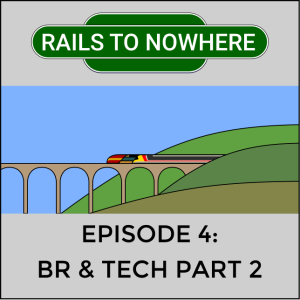
Monday Jan 30, 2023
E4 - BR and Technology Part 2 - The 1960s & 70s
Monday Jan 30, 2023
Monday Jan 30, 2023
Join Simon and Ela for the second in our mini series of episodes looking at British Railways relationship with inovation. In this episode we move on into the swinging sixties, explore the APT and HST and discuse less talked about improvements such as AWS and TOPS.
Support us on Patreon: www.patreon.com/railstonowhere
Simon on Twitter: www.twitter.com/reddragontweets
Thanks to our wonderful Patreons who help make Rails to Nowhere happen and especial thanks to our £10 patreon ValkyrieLeamons.
Music: ‘Koala’ David Cutter Music - www.davidcuttermusic.com
For those who wish to view on youtube the video can be found here https://youtu.be/VZ-hLSc8ir0
Bibliography
Research for this episode was carried out using a number of sources including parts of the National Railway Museum library collection and the national archive. Below are the principle texts used to research this episode.
125 Group. 125 An Enduring Icon. Stroud: Amberley, 2018.
125 Group. Inter-City 125: High Speed Train (1972 Onwards - All Models). Yeovil: Haynes Publishing, 2019.
Bagwell, Philip, and Peter Lyth. Transport in Britain 1750 - 2000: From Canal Lock to Gridlock. London: Hambledon & London, 2002.
Barnett, Roger. British Rail’s InterCity 125 and 225. Berkley, 1992.
Clough, David. APT: The Untold Story. Addlestone: Ian Allan, 2016.
Clough, David. The Modernisation Plan: British Railway’s Blueprint for the Future. Hersham: Ian Allan, 2014.
Divall, Colin, and Hiroki Shin. ‘Engineers v. Industrial Designers: The Struggle for Professional Control over the British Rail Mark 2 Coach, c. 1955-1966’. The Journal of Transport History 39, no. 2 (2018): 145–69.
Gilchrist, Alastair. A History of Engineering Research on British Railways. Working Papers in Railway Studies. York, 2006.
Gourvish, Terence. British Railways 1948-73: A Business History. Cambridge: Cambridge University Press, 2011.
Green, Chris, and Mike Vincent. The Intercity Story: 1964-2012. Hersham: Oxford Publishing Co, 2013.
Jackson, Tanya. British Rail: The Nations Railway. Stroud: The History Press, 2014.
Kichenside, Geoffrey, and Alan Williams. Two Centuries of Railway Signalling. 2nd ed. Addlestone: Oxford Publishing Co, 2016.
Loft, Charles. Government, the Railways and the Modernization of Britain: Beeching’s Last Trains. Abingdon: Routledge, 2006.
Marr, Andrew. A History of Modern Britain. London: Macmillan, 2007.
Middleton, William, Rick Morgan, and Roberta Diehl, eds. Encyclopaedia of North American Railroads. Bloomington: Indiana University Press, 2007.
Nock, Oswald. Two Miles A Minute: The Story Behind the Conception and Operation of Britain’s High Speed and Advanced Passenger Trains. Cambridge: Patrick Stephens Ltd, 1980.
Poole, Stephen. Inside British Rail: Challenges and Progress on the Nationalised Railway 1970s-1990s. Stroud: The History Press, 2018.
Potter, Stephen. ‘Cutting-Edge Technology’. Technology Analysis & Strategic Management 1, no. 1 (1989): 99–122.
Potter, Stephen. On the Right Lines? The Limits of Technological Innovation. New York: St Martin’s Press, 1987.
Pyrgidis, Christos. Railway Transportation Systems: Design, Construction and Operation. Boca Raton: CRC Press, 2016.
Rothwell, R, and P Gardiner. ‘Invention, Innovation, Re-Innovation and the Role of the User: A Case Study of British Hovercraft Development’. Technovation 3 (1985): 167–86.
Simmons, Jack, and Gordon Biddle, eds. The Oxford Companion to British Railway History: From 1603 to The 1990s. Oxford: Oxford University Press, 1997.
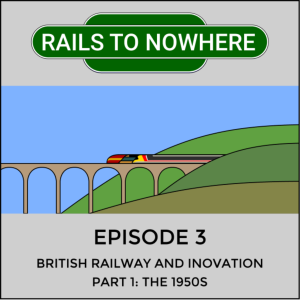
Wednesday Mar 09, 2022
E3 - British Railways and Technology Part 1 - The 1950s
Wednesday Mar 09, 2022
Wednesday Mar 09, 2022
Join Simon and Ela for the first in a mini series of episodes looking at British Railways relationship with inovation. In this first episode we look a bit at the pre BR era, the Modernisation Plan, the work BR carried out in the early 1950 and the start of the swinging sixties.
Support us on Patreon: www.patreon.com/railstonowhere
Simon on Twitter: www.twitter.com/reddragontweets
Thanks to our wonderful Patreons who help make Rails to Nowhere happen and especial thanks to our £10 patreon ValkyrieLeamons.
Music: ‘Koala’ David Cutter Music - www.davidcuttermusic.com
For more on OLE check out Gary Keenor’s excellent book at ocs4rail.com
Research for this episode was carried out using a number of sources including parts of the National Railway Museum library collection and the national archive. Below are the principle texts used to research this episode.
Bibliography
Bagwell, Philip, and Peter Lyth. Transport in Britain 1750 - 2000: From Canal Lock to Gridlock. London: Hambledon & London, 2002.
Bradley, Rodger. ‘British Railways: The 1948 Interchange Trials’. Railway Matters: On Track, n.d. Accessed https://railwaymatters.files.wordpress.com/2018/07/the-1948-interchange-trials_v2.pdf.
British Transport Commission. Modernisation and Re-equipment of British Railways. London, 1955.
Clough, David. The Modernisation Plan: British Railway’s Blueprint for the Future. Hersham: Ian Allan, 2014.
Gourvish, Terence. British Railways 1948-73: A Business History. Cambridge: Cambridge University Press, 2011.
Jackson, Tanya. British Rail: The Nations Railway. Stroud: The History Press, 2014.
Kichenside, Geoffrey, and Alan Williams. Two Centuries of Railway Signalling. 2nd ed. Addlestone: Oxford Publishing Co, 2016.
Loft, Charles. Government, the Railways and the Modernization of Britain: Beeching’s Last Trains. Abingdon: Routledge, 2006.
Marr, Andrew. A History of Modern Britain. London: Macmillan, 2007.
Primary Sources:
Her Majesties Government. ‘Railway Act 1921’ (1921).
Her Majesties Government. ‘Transport Act 1947’ (1947).
British Transport Commission. Modernisation and Re-equipment of British Railways. London, 1954.
British Transport Commission. Modernisation of British Railways: The System of Electrification for British Railways. London, 1956.
British Transport Commission. Re-appraisal of the Plan or the Modernisation and Re-equipment of British Railways. London, 1959.
A special note of thanks to www.railwaysarchive.co.uk for their wonderful work in digitising the documents referenced in this episode.
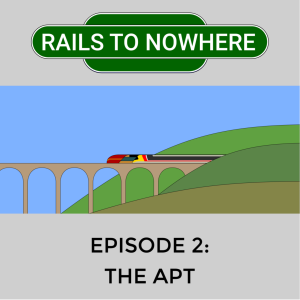
Sunday Sep 19, 2021
E2 - The Technology Behind the APT
Sunday Sep 19, 2021
Sunday Sep 19, 2021
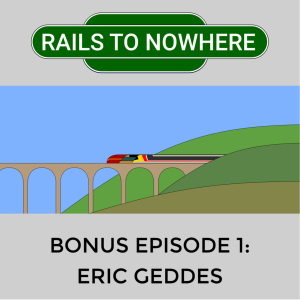
Thursday Aug 26, 2021
B1 - Eric Geddes Bonus (UNLOCKED)
Thursday Aug 26, 2021
Thursday Aug 26, 2021
Welcome to the first bonus episode of Rails to Nowhere where Simon and Ela are discusing the man behind the Railway Act 1921. Ordinarly a Patreon only feature this months bonus episode is coming to the public feed as well to give you a taste of what you can get as a thank you for joining our patreon.
Support our Patreon for bonus episodes, behind the scenes content and more: www.patreon.com/railstonowhere
Music: ‘Koala’ David Cutter Music - www.davidcuttermusic.com
Research for this episode was carried out using a number of sources including parts of the National Railway Museum library collection. Below are the principle texts used to research this episode.
Bibliography
Acworth, W. M. 1920. Historical Sketch of State Railway Ownership. London: John Murry.
Bagwell, Philip, and Peter Lyth. 2002. Transport in Britain 1750-2000: From Canal Lock to Gridlock. London: Hambledon & London.
Barker, Theo, and Dorian Gerhold. 1993. The Rise and Rise of Road Transport, 1700-1990. London: Studies in Economic and Social History.
Bonavia, M. R., and T. C. Barker. 1978. Railway Policy Between the Wars. London: City of London Polytechnic.
Cline, Peter K. 1974. “Eric Geddes and the 'Experiment' with Businessmen in Government, 1915-1922.” In Essays in Anti-Labour History: Responses to the Rise of Labour in Britain, edited by Kenneth D. Brown, 74-104. London: Palgrave Macmillan.
Emil Davies, A. 1908. The Nationalization of Railways. London: Adam and Charles Black.
Grieves, Keith. 1989. Sir Eric Geddes: Business and Government in War and Peace. Manchester: Manchester University Press.
Hylton, Stuart. 2016. What the Railways did for us. Stroud: Amberley.
Phillips, Christopher. Civilian Specialists at War: Britain's Transport Experts and the First World War. London, University of London Press, 2020.
Robbins, Michael. 1998. The Railway Age. Manchester: Manchester University Press.
Webb, Simon. 2016. Commutters: The History of a British Way of Life. Barnsley: Pen & Sword.
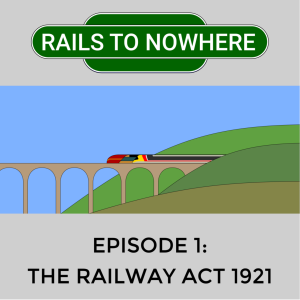
Sunday Aug 15, 2021
E1 - The Railway Act 1921
Sunday Aug 15, 2021
Sunday Aug 15, 2021
In this episode of Rails to Nowhere, join Simon and Ela as they take a deep dive into the Railway Act 1921, the context around it and the potential learning points we can take away and apply to the modern age.
Support our Patreon for bonus episodes, behind the scenes content and more: www.patreon.com/railstonowhere
Music: ‘Koala’ David Cutter Music - www.davidcuttermusic.com
Research for this episode was carried out using a number of sources including parts of the National Railway Museum library collection. Below are the principle texts used to research this episode.
Bibliography
Acworth, W. M. 1920. Historical Sketch of State Railway Ownership. London: John Murry.
Bagwell, Philip, and Peter Lyth. 2002. Transport in Britain 1750-2000: From Canal Lock to Gridlock. London: Hambledon & London.
Barker, Theo, and Dorian Gerhold. 1993. The Rise and Rise of Road Transport, 1700-1990. London: Studies in Economic and Social History.
Cline, Peter K. 1974. “Eric Geddes and the 'Experiment' with Businessmen in Government, 1915-1922.” In Essays in Anti-Labour History: Responses to the Rise of Labour in Britain, edited by Kenneth D. Brown, 74-104. London: Palgrave Macmillan.
Emil Davies, A. 1908. The Nationalization of Railways. London: Adam and Charles Black.
Grieves, Keith. 1989. Sir Eric Geddes: Business and Government in War and Peace. Manchester: Manchester University Press.
Hylton, Stuart. 2016. What the Railways did for us. Stroud: Amberley.
Phillips, Christopher. Civilian Specialists at War: Britain's Transport Experts and the First World War. London, University of London Press, 2020.
Robbins, Michael. 1998. The Railway Age. Manchester: Manchester University Press.
Webb, Simon. 2016. Commutters: The History of a British Way of Life. Barnsley: Pen & Sword.

